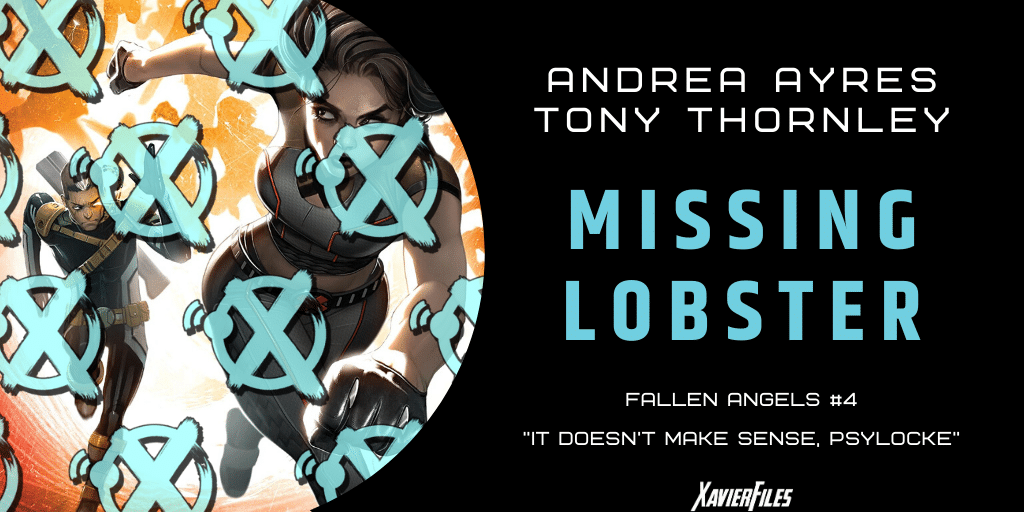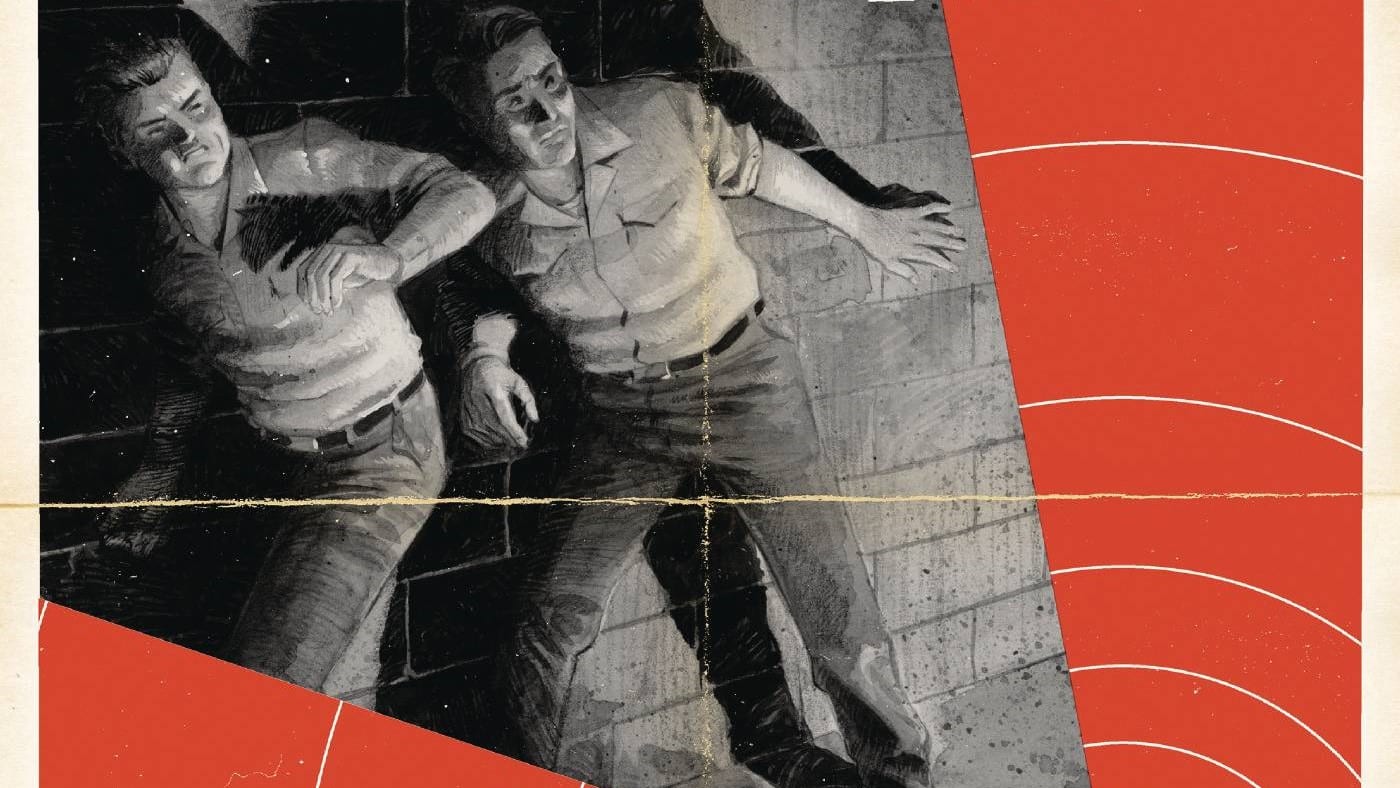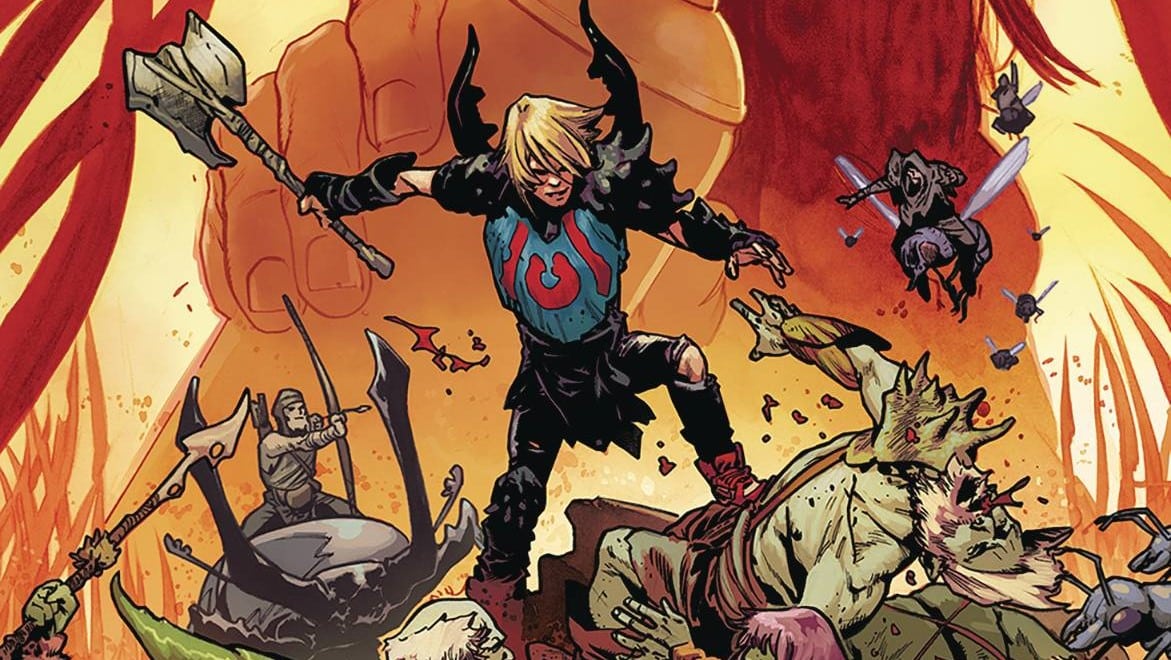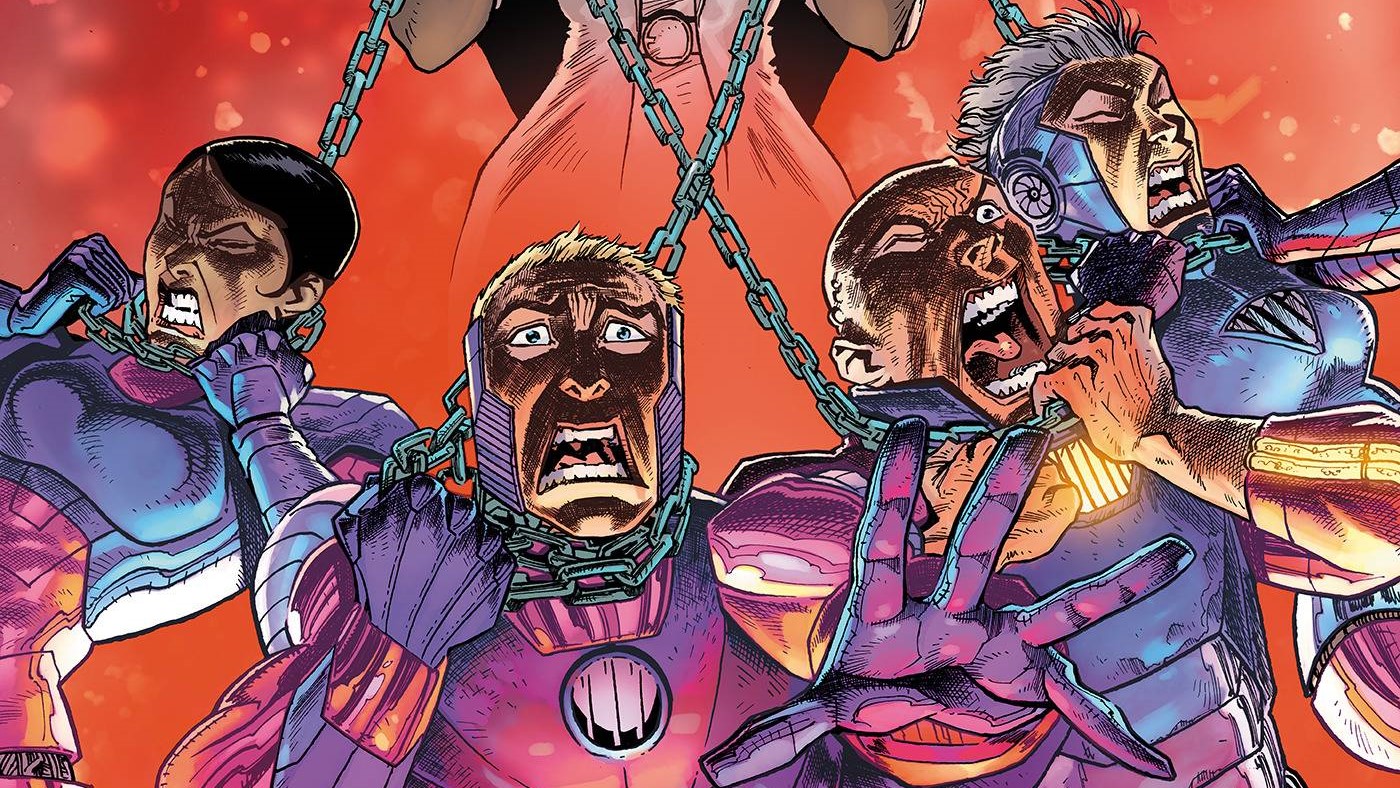In Fallen Angels #4 from Bryan Edward Hill, Szymon Kudranski, and Frank D’Armata we learn a lot about Apoth. That’s about it.
Andrea Ayres: Fallen Angels #4 is back and for me not a vast improvement on the previous issues. We open with a warning: “Do not trust peace. That’s where death hides.”
Do you know how cliche it sounds to me to be warned not to trust peace? I cannot get over how much this writing and storyline feels like it was the result of a machine learning experiment gone awry. It feels very predictable, that could also be because there’s so much repetition. Repetition of backgrounds, poses, language and of Psylocke telling Laura to control herself. I’m guessing this all sounds pretty harsh.
“But suffering is a waste of time. A human thing.”
Tony Thornley : You know what? I don’t think it’s a vast improvement… but I liked it better. It’s probably because three-quarters of the issue was about Apoth, who I’ve already said is my favorite part of the book. He’s definitely not without his problems, which we’ll get into later.
Artificial Intelligence

TT: But here we are again before we get into the Apoth stuff with more of the awkward Psylocke/Laura relationship. It’s funny too because this week’s Battle of the Atom reminded me that the first X-Man Laura connected with was Psylocke (Betsy), way back in the Uncanny X-Men 450’s. It must frustrate Laura that this stranger wearing her friend’s face is talking to her like this. Though after that story the two haven’t interacted a ton, they had a very sweet almost sisterly relationship, which really emphasizes the differences between Betsy and Kwannon. I totally get and agree with your frustrations because of it.
AA: I think that’s what bothers me about the relationship between Laura and Psylocke. I don’t feel like I have a great understanding for why these characters are behaving or interacting in the way they do. Remember when Laura brought up Betsy and Kwannon flipped? Which I guess just strikes me as weird because Kwannon keeps telling Laura she has to control her anger and her emotions, which suggests to the reader (at least in theory) that Kwannon has more of a mastery over hers. Time and again, however, Kwannon acts irrationally and emotionally. So it disrupts her development as a character and the relationship Hill is trying to set up between the two.
Of course I can only focus on their dynamic when I’m not horrifically distracted by their anatomy. One of my greatest peeves is the frequency of which both X-23 and Psylocke stand with their hips-popped to the side (eight times in this issue). Throughout issue 4 we see the same problems that have plagued the series: plastic expressions and so…much…dark.
TT: However, this Kwannon/Laura interaction leads towards more endangered kids and Apoth opening himself up to Psylocke, which… gets us right back into that overwrought narration.
AA: True. I still can’t seem to get over this feeling that the script seems to be arguing with itself. A few pages later, Apoth speaks through a possessed child, telling Psylocke, “Your friend wants a fight. Machines, blades and guns. Fighting won’t solve this.”
But I thought peace could not be trusted? It’s one thing to have an untrustworthy narrator, it’s another to have an untrustworthy narrative. From one page to the next, one issue to another, there isn’t a shred of narrative for the reader to sink their claws into (I’m sorry).
Suffering clearly isn’t only a human thing because Apoth suffers (as this issue explores), the mutants suffer, the tools of Apoth suffer. Maybe there is another iteration of this series where I care but that would have been predicated on characters whose rationale had been established in a way I bought into, but I don’t. I don’t know. I don’t know Tony!
“And I found my way out. Stronger than their firewalls.”
“I saw my freedom in the world. Data streams like pathways.”
Cringe. The take on AI as a threat might be compelling if it didn’t feel like it was coming from the Windows 95 operating system. It’s just relying on elementary terms to say: “These themes, they are big. Bigger than your pretty little heads can possibly imagine.”
TT: There is so much melodrama there. It’s kind of like Apoth is the emo kid who’s trying to convince everyone he’s blossomed while still being deep and introspective while still being DEEPLY DEEPLY emo.
Apoth The Devil

TT: Can we talk a bit about the biblical references Apoth makes though? So Apoth declares that after he became fully self aware, the first thing he read was the Bible. I don’t think he read it very well. I get what’s trying to be presented here, and I actually like the visual shifts between Psylocke, the possessed kid and the nightmare mechanical monster standing in front of Cable. However, the words just fall flat.
AA: I absolutely defer to you on this and have been waiting to hear your thoughts on this! I wondered why a seemingly self-aware AI (if that’s what Apoth is) would choose the bible? It also seems to be a misunderstanding of how AI would acquire or access data?
TT: Right? It’s a strange choice.
AA: There is an assumption that the AI would order their executive functions the same way a human mind would which I don’t think is right. It would be many computations occuring at once. It implies it is self-aware. If an AI is self aware, this implies it has reached a singularity. If that is the case then it would not only be able to parse much more information than a single book but it would operate this way by default. I’ll get back to this in a bit but I’m curious to know what you latched onto?
TT: First of all, Apoth says he decided that he is God and then “Lucifer in defiance of the fire.” In the Bible there’s one reference to a Lucifer,
How art thou fallen from heaven, O Lucifer, son of the morning! how art thou cut down to the ground, which didst weaken the nations!
Isaiah 14:12 (KJV)
How did Apoth decide Lucifer was the devil from that passage? Though Lucifer is popularly interpreted as a fallen angel from a literal, out-of-context read of that passage of scripture, by no means is he literally the devil there [Ed. note: That passage most likely refers to the king of Babylon]. The devil is more commonly referred to as the devil or Satan, and it’s only with additional theological context can you connect this verse to Satan. Then it goes on, that Apoth is the voice that guided Noah and the flood, as if they were opposing forces like God and Lucifer [Ed. note: God did the flood]. It’s a baffling sequence, that then makes a leap of logic- “You are my mother because God wants one.”
HOW DID APOTH GET THERE? I am completely at a loss for the internal logic of this story thread.
AA: Yes. YES!! I am so grateful for you bring the knowledge on that one because it makes me think a little differently about this comic. There’s obviously been work here to build out this narrative, but it just feels unfinished. Part of that stems from the art, much stems from the logic leaps. The logic leaps. Take the way AI is represented. At the end of the issue there is a mock phone interview with S. Nakamoto. “One, my project is not alive. It is an intelligence, but it’s nothing more than binary construction. Evil. Cruelty. Rage. These are all things that stem from what people would call a soul. This project has no soul. It does not live.”
Feels necessary to note that harm is not dependent on one having morals, a soul, or ethics. Those are emotional terms people apply to their behaviors.
There are many documented explorations of the ways artificial intelligence can go awry by people much smarter than I. Remember when I talked about AI singularities above? There is something known as malignant failure. That’s an instance where the AI results in human extinction, is known as infrastructure profusion. Say you give AI a very simple goal, make 10 paper clips. Because an AI would never assign a probability of 100%, it just keeps making paper clips…redirecting all resources towards the goal of creating paper clips until we all die. I bring this up because like an AI never assigning a probability of 100% (because it’s more valuable for the AI to assign at least some probability that its goal had not been completed) the idea that Apoth (an intelligent lifeform) would simply stop at reading the Bible doesn’t ring true for me for what Apoth is supposed to be. I’m not trying to rewrite what Hill is trying to do with this story, but I do think it’s worth pointing to its messy construction and why it grates.
Nice Guy Apoth

AA: Guess what this lady is tired of? Characters using their mother and/or mother-figures to justify harm. “I only killed that girl because I will not share you. I have mercy Mother.”
The threats Apoth makes to Psylocke are pretty much textbook abusive behavior and it unsettles me for a few reasons. The first being that it puts the responsibility of navigating Apoth’s behavior, moods, and the outcome of its actions not on Apoth itself but Psylocke. The notion Psylocke is somehow responsible because she apparently ‘gave birth’ to it by setting it free… Naw.
TT: Not just setting it free. She had the option to run her sword through it, and it deceived her by using a child’s voice. So Apoth gaslit Kwannon, and somehow he’s turned that into an affection for this sympathetic woman.
AA: We can presume given this issue that Apoth was created by humans, Hill doesn’t outry specify whom, but why don’t we see Apoth attach to its creator the way we do Psylocke? The reason provided is because Psylocke set him free and showed kindness. I dunno, the whole thing gives me a weird Oedipus feel. Because Psylocke displayed some sort of emotion towards the technology, it latched onto her? It reeks of ‘Nice Guy’ syndrome. Nice guys are only so good so far as you feed their ego, do what they want and behave in a manner they sanction. Maybe that’s the point? At this point though, I don’t believe this comic has earned the benefit of the doubt. We can demonstrate monstrosity without killing kids, threatening women, breaking their backs.. Sigh. I’ve had enough.
TT: Yeah, unfortunately, I think this series is going to end up remembered as a failed and wildly inconsistent experiment. The antagonist is interesting, if deeply, deeply flawed, but our heroes are just not working at all. Two more issues, and we’ll see.
AA: I simply can’t help but feel this comic was a long way away from being complete. There are intriguing ideas and nods to character development, but none of it ever coalesces or seems to pay off.
X-Traneous Thoughts

- This issue’s Krakoan tease: Pupa
- It may seem like we don’t like this issue, but it moves from both us disliking it to a split decision (while still deeply flawed).
- Once again, barely any Cable in this issue. At least he’s getting his own series to make up for it. Hopefully Laura does too.
- MOON. (At least it’s a better background than acid trip rainbows)
- Kids, they aren’t just for killing! (You can break their back too)
- Make sure to check out this week’s coverage of Fallen Angels #4, New Mutants #3 and #4, Marauders #4, and X-Force#4
Andrea Ayres writes about comics and culture. She loves research, coffee, and lifting weights.
Tony Thornley is a geek dad, blogger, Spider-Man and Superman aficionado, X-Men guru, autism daddy, amateur novelist, and all around awesome guy. He’s also very humble.







